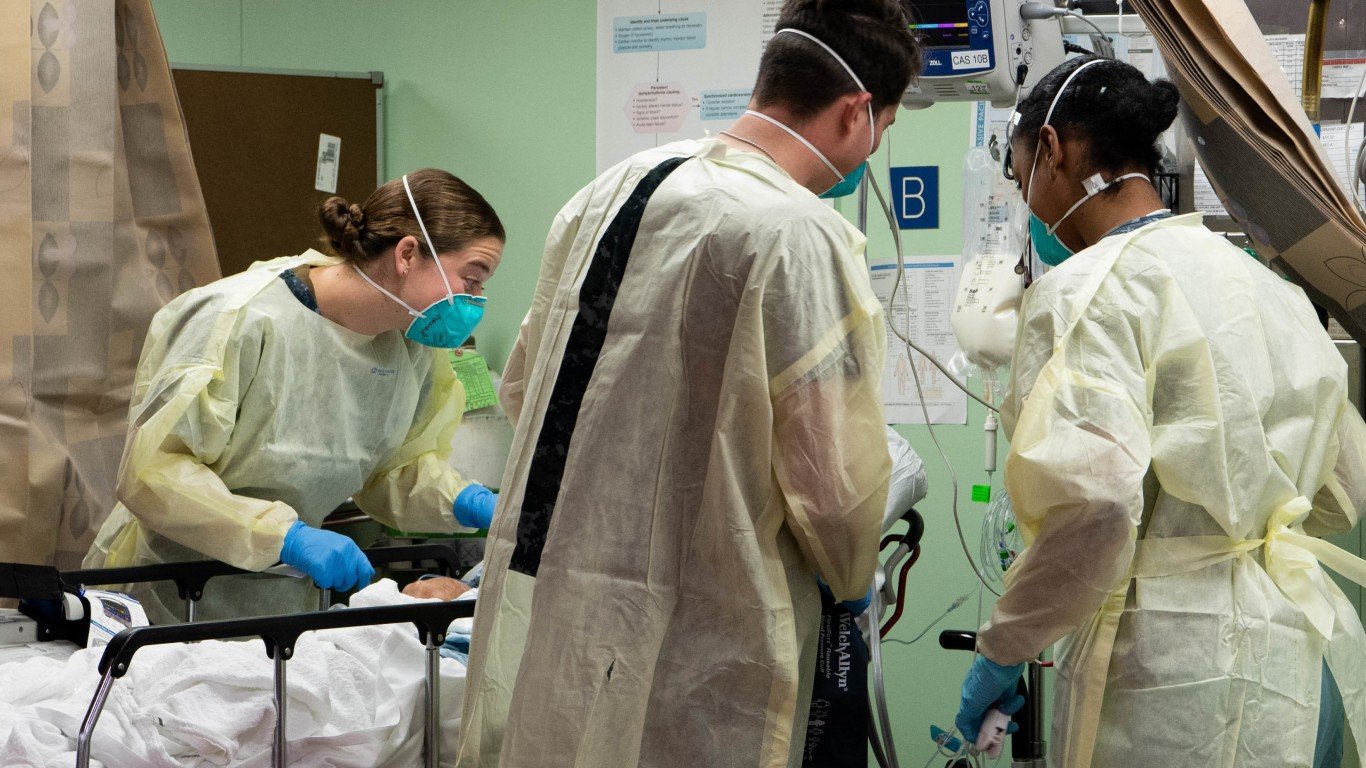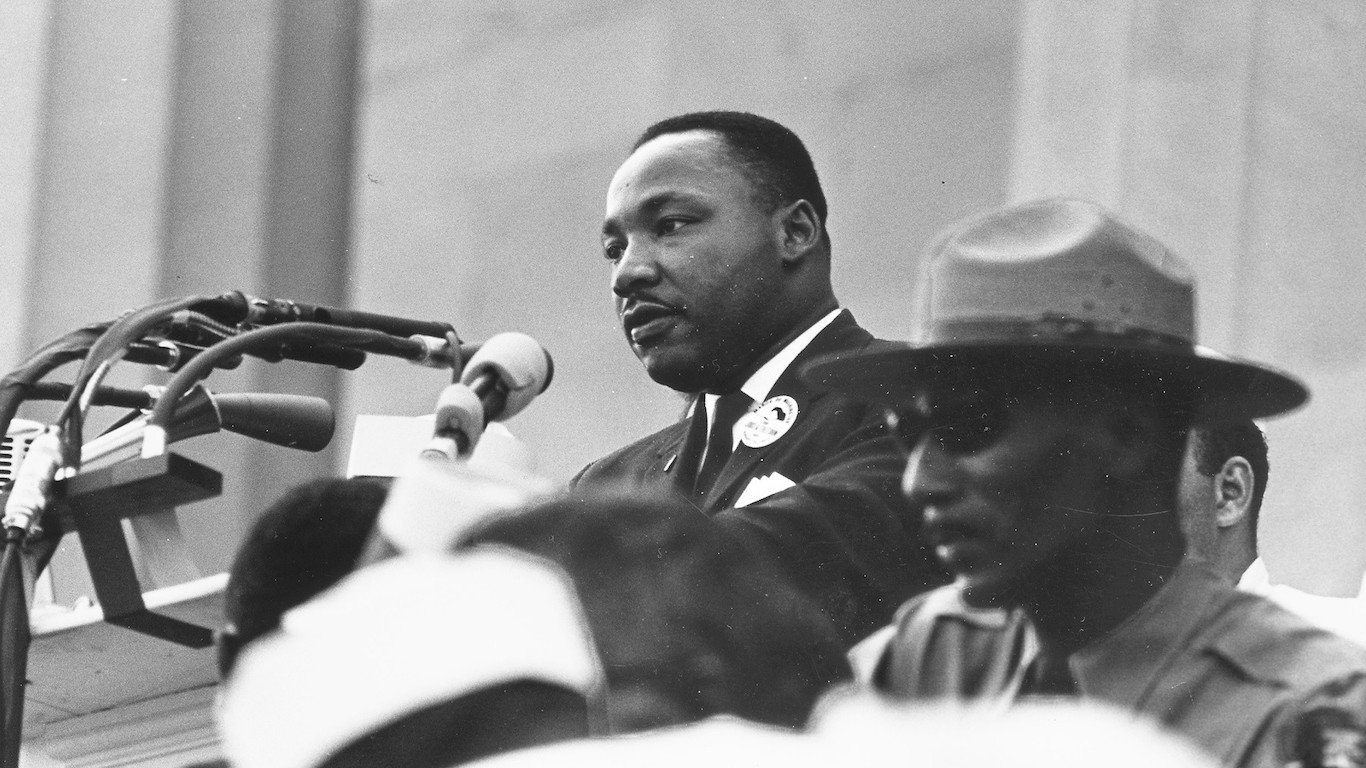

The U.S. reported over 665,000 new cases of coronavirus over the seven days ending June 26, bringing the total count to more than 85.6 million confirmed cases of COVID-19. There have been more than 1,005,000 COVID-19-related deaths — the highest death toll of any country.
New cases continue to rise, albeit at a slowing rate. In the past week, there were an average of 26.4 daily new coronavirus cases per 100,000 Americans — a decrease from the week prior, when there were an average of 32.0 daily new coronavirus cases per 100,000 people.
While new data shows that the risk of contracting COVID-19 is high in almost every part of the country, cities continue to be the sites of major outbreaks and superspreader events. Experts agree that the virus is more likely to spread in group settings where large numbers of people routinely have close contact with one another, such as colleges, nursing homes, bars, and restaurants. Metropolitan areas with a high degree of connectivity between different neighborhoods and a large population may be particularly at-risk.
In the 50 largest metro areas, the incidence of COVID-19 grew at an average rate of 29.3 new cases a day per 100,000 residents in the past week — 14.3% greater than the case growth in all counties outside of metro areas.
The Walla Walla, WA metro area consists of just Walla Walla County. As of June 26, there were 27,118.4 confirmed cases of COVID-19 per 100,000 Walla Walla residents, roughly in line with the national rate. For comparison, the U.S. has so far reported 26,532.2 cases per 100,000 Americans nationwide.
In order to slow the spread of COVID-19, city and county governments have ordered the closure of thousands of consumer-facing businesses. These measures have led to widespread job loss and record unemployment. In the Walla Walla metro area, unemployment peaked at 12.7% in April 2020. As of November 2021, the metro area’s unemployment rate was 3.9%.
To determine how the incidence of COVID-19 in the Walla Walla, WA metro area compares to the rest of the country, 24/7 Wall St. compiled and reviewed data from state and local health departments. We ranked metro areas based on the number of confirmed COVID-19 cases per 100,000 residents.To estimate the incidence of COVID-19 at the metropolitan level, we aggregated data from the county level using boundary definitions from the U.S. Census Bureau. Population data used to adjust case and death totals came from the U.S. Census Bureau’s 2019 American Community Survey and are five-year estimates. Unemployment data is from the Bureau of Labor Statistics and is seasonally adjusted.
| FIPS | MSA | Population | Confirmed COVID-19 cases as of June 26 | Confirmed COVID-19 cases as of June 26 per 100,000 residents | Cumulative COVID-19 deaths as of June 26 | Cumulative COVID-19 deaths as of June 26 per 100,000 residents |
|---|---|---|---|---|---|---|
| 28420 | Kennewick-Richland, WA | 289,527 | 88,128 | 30,438.6 | 696 | 240.4 |
| 49420 | Yakima, WA | 249,697 | 73,982 | 29,628.7 | 796 | 318.8 |
| 48300 | Wenatchee, WA | 118,252 | 32,960 | 27,872.7 | 238 | 201.3 |
| 47460 | Walla Walla, WA | 60,365 | 16,370 | 27,118.4 | 146 | 241.9 |
| 44060 | Spokane-Spokane Valley, WA | 550,160 | 140,917 | 25,613.8 | 1,558 | 283.2 |
| 31020 | Longview, WA | 106,778 | 24,268 | 22,727.5 | 354 | 331.5 |
| 42660 | Seattle-Tacoma-Bellevue, WA | 3,871,323 | 838,858 | 21,668.5 | 5,487 | 141.7 |
| 13380 | Bellingham, WA | 220,821 | 42,442 | 19,220.1 | 311 | 140.8 |
| 34580 | Mount Vernon-Anacortes, WA | 125,612 | 24,088 | 19,176.5 | 210 | 167.2 |
| 36500 | Olympia-Lacey-Tumwater, WA | 279,711 | 53,118 | 18,990.3 | 425 | 151.9 |
| 14740 | Bremerton-Silverdale-Port Orchard, WA | 265,882 | 44,408 | 16,702.1 | 361 | 135.8 |
Sponsored: Find a Qualified Financial Advisor
Finding a qualified financial advisor doesn’t have to be hard. SmartAsset’s free tool matches you with up to 3 fiduciary financial advisors in your area in 5 minutes. Each advisor has been vetted by SmartAsset and is held to a fiduciary standard to act in your best interests. If you’re ready to be matched with local advisors that can help you achieve your financial goals, get started now.
Thank you for reading! Have some feedback for us?
Contact the 24/7 Wall St. editorial team.



